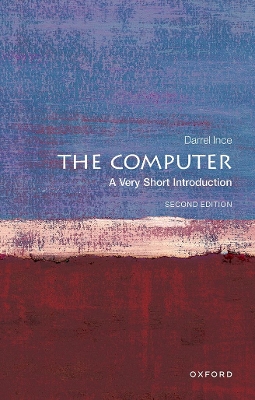Very Short Introductions
1 total work
There is a companion web site asssociated with the book (http://vsicomputer.wordpress.com/). It contains chapter summaries, links to relevant material and posts about items of news relevant to the book's contents.
Computers have changed so much since the room-filling, bulky magnetic tape running monsters of the mid 20th century. They now form a vital part of most people's lives. And they are more ubiquitous than might be thought - you may have more than 30 computers in your home: not just the desktop and laptop but think of the television, the fridge, the microwave. But what is the basic nature of the modern computer? How does it work? How has it been possible to squeeze so much power into increasingly small machines? And what will the next generations of computers look like?
In this Very Short Introduction, Darrel Ince looks at the basic concepts behind all computers; the changes in hardware and software that allowed computers to become so small and commonplace; the challenges produced by the computer revolution - especially whole new modes of cybercrime and security issues; the Internet and the advent of 'cloud computing'; and the promise of whole new horizons opening up with quantum computing, and even computing using DNA.
ABOUT THE SERIES: The Very Short Introductions series from Oxford University Press contains hundreds of titles in almost every subject area. These pocket-sized books are the perfect way to get ahead in a new subject quickly. Our expert authors combine facts, analysis, perspective, new ideas, and enthusiasm to make interesting and challenging topics highly readable.
Computers have changed so much since the room-filling, bulky magnetic tape running monsters of the mid 20th century. They now form a vital part of most people's lives. And they are more ubiquitous than might be thought - you may have more than 30 computers in your home: not just the desktop and laptop but think of the television, the fridge, the microwave. But what is the basic nature of the modern computer? How does it work? How has it been possible to squeeze so much power into increasingly small machines? And what will the next generations of computers look like?
In this Very Short Introduction, Darrel Ince looks at the basic concepts behind all computers; the changes in hardware and software that allowed computers to become so small and commonplace; the challenges produced by the computer revolution - especially whole new modes of cybercrime and security issues; the Internet and the advent of 'cloud computing'; and the promise of whole new horizons opening up with quantum computing, and even computing using DNA.
ABOUT THE SERIES: The Very Short Introductions series from Oxford University Press contains hundreds of titles in almost every subject area. These pocket-sized books are the perfect way to get ahead in a new subject quickly. Our expert authors combine facts, analysis, perspective, new ideas, and enthusiasm to make interesting and challenging topics highly readable.
